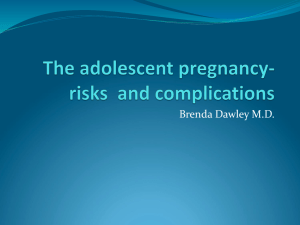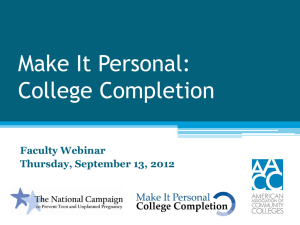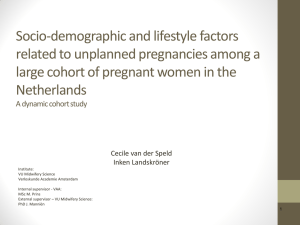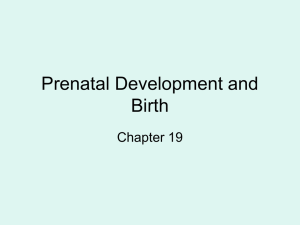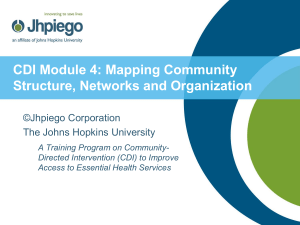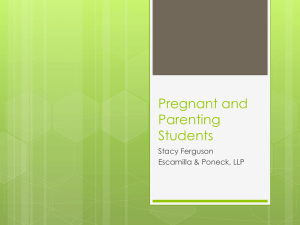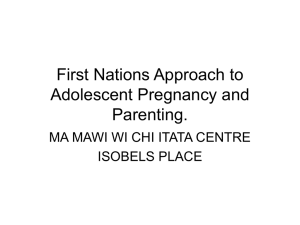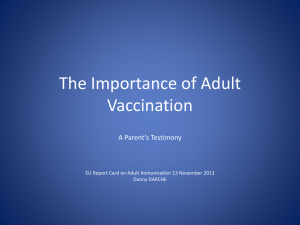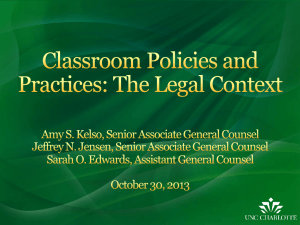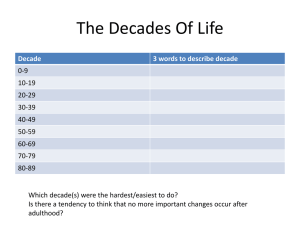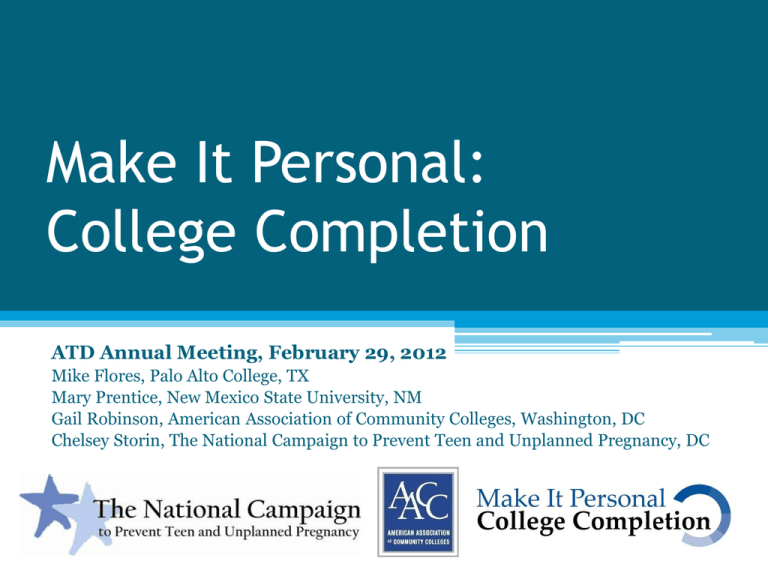
Make It Personal:
College Completion
ATD Annual Meeting, February 29, 2012
Mike Flores, Palo Alto College, TX
Mary Prentice, New Mexico State University, NM
Gail Robinson, American Association of Community Colleges, Washington, DC
Chelsey Storin, The National Campaign to Prevent Teen and Unplanned Pregnancy, DC
Sixty-one percent (61%)
of women who have children
while enrolled in community
college drop out and do not
return to school.
What Is MIPCC?
• Three-year national demonstration project
• Improve community college student retention
and success by addressing pregnancy planning,
prevention, and healthy relationships
• Funded by The National Campaign to Prevent
Teen and Unplanned Pregnancy
• Managed by the American Association of
Community Colleges
What Is MIPCC?
• MIPCC Colleges
Chattahoochee Technical College, GA
Georgia Perimeter College, GA
Mesa Community College, AZ
Montgomery College, MD
Palo Alto College, TX
• Curriculum-based strategy: service learning
• Replicable curricular content and materials developed for
use by other community colleges
• Pre/post-course surveys to track knowledge, attitudes,
behavioral intent, retention
MIPCC Course Objectives
• Understand how unplanned pregnancy can affect
college completion
• Understand the importance of healthy relationships
• Know what campus and community resources are
available to pregnant and parenting college students
and their partners
• Be familiar with a variety of birth control options
and where to get them in the community (e.g.,
www.bedsider.org)
• Be exposed to various online information sources
(e.g., www.studentsexlife.org)
MIPCC Courses
•
•
•
•
•
•
College 101
Communications
Counseling
Education
English
English for
Speakers of
Other Languages
•
•
•
•
•
•
•
•
Ethics
Health
Kinesiology
Mental Health
Political Science
Sociology
Statistics
Women’s History
Test Your Knowledge
• ______ out of 10 community college
students report getting information on
pregnancy planning and prevention from
their schools.
Two
Test Your Knowledge: The Fog Zone
• Condoms have no expiration date.
False
MIPCC Phase I Evaluation
• Pre-survey: 22 questions; focus on attitudes,
knowledge, and behavior around pregnancy
prevention
• Service learning during the course
• Post-survey: same as pre-survey but with an
additional six questions about the course’s
impact on pregnancy prevention knowledge and
behavior
Phase I Results: Demographics
Post-survey: 665 surveys
100%
93%
94%
75% 66% 65%
61%
50%
72% 75%
60%
56%
54%
37%
25%
0%
4
-2
8
1
m
Fe
ale
e
te
g
ht
m
nt
ith
es
at
eg
g
a
hi
re
i
r
e
Y
d
w
a
p
p
d
/r F
W
r
u
e
nt
hip
cl
St
iv
an
stu
Pa
l
l
e
x
/
s
r
t
p
n
E
w
ld
ur
no
io
un
hi
c
t
r
ve
c
a
v
i
l
e
e
L
No
Re
No
pr
r tn
a
P
No
Phase I: Matched Survey Results
Q12. Highest educational goal in next five years
Phase I: Matched Survey Results
Q13. Current importance of pregnancy prevention
Phase I: Matched Survey Results
Q14. Would pregnancy make it harder to achieve
educational goals?
100%
84% 87%
75%
Pre
50%
Post
25%
13% 11%
4% 2%
0%
Yes
No
Don't know
Phase I: Change in Knowledge
Q16d: I know where to go in my community to get birth control
Q16e: I know about prescription birth control methods that have no
hormonal side effects
Q16f: I know about prescription birth control methods that can be
taken once and are long lasting
Phase I: Change in Knowledge
• Question 18a-p: knowledge about 16
specific methods for preventing pregnancy
• Average pre-survey score = 2.65
• Average matched post-survey score = 3.03*
*Statistically significant increase
Rating scale:
1 = Not at all; 2 = Somewhat; 3 = Moderately; 4 = Definitely
Phase I: Change in Behavior
Q19: In the last three months, I used a method of birth control:
*Not included: Percentage that is unable to get or get someone else pregnant or did not
have sex
Phase I: Behavior
Q20: In the next three months, likelihood of having sex without
birth control:
*Not included: Percentage of don’t know, unable to get or get someone else
pregnant, or do not expect to have sex
Phase I: Behavior
Q21: How comfortable would you be with talking to a sexual
partner about using contraception?
100%
80%
72%
75%
Pre
50%
Post
17% 13%
25%
6% 4%
5% 3%
0%
Very comfortable
Somewhat
comfortable
Somewhat
uncomfortable
Very
uncomfortable
Phase I: Post-Survey Questions
Q24: Before I took this course, I had thought about how a/another pregnancy would affect achieving
my future goals.
As a result of taking this course:
Q25: I have thought about how a/another pregnancy would affect my educational goals.
Q26: I am aware of more ways to prevent pregnancy.
Q27: I am more likely to prevent getting pregnant or getting someone pregnant until after I achieve
my educational goals.
Q28: I am more committed to avoiding an unplanned pregnancy.
4
2.76
2.96
3.13
3.07
3.17
3
4 = Definitely
3 = Moderately
2
2 = Somewhat
1 = Not at all
Av. Response
1
0
Q24
Q25
Q26
Q27
Q28
Test Your Knowledge: The Fog Zone
• Wearing two latex condoms will provide
extra protection.
False
Test Your Knowledge: The Fog Zone
• Pregnancy is much less likely to occur if a
couple has sex standing up.
False
Palo Alto College’s
MIPCC Project
• Communications
• Counseling
• Kinesiology
• Personal Health
Communications Course
• Focus on news reporting and writing
• Students will research unplanned pregnancy via
www.bedsider.org, www.studentsexlife.org, and
other sources
• Students will write press releases for
community-based organizations
• Students will present to high school students
about preventing teen pregnancy
Counseling/Student Development
Course
• Large target – approximately 1,500 FTICs
• Incorporating the Smart Decisions Curriculum
Preventive Health Education
• Proyecto Saber y Salud Peers
What Will Students Learn?
• Elements of news writing and public relations
• Familiarity with a wide variety of contraceptives
• Knowledge about where to go for help should
they become pregnant or get someone pregnant
• Familiarity with resources to which they can
direct others
• Determination to make informed decisions
about pregnancy and staying in school
The National Campaign to Prevent
Teen and Unplanned Pregnancy
• National nonprofit, nonpartisan organization
• Has been great progress on reducing teen
pregnancy, but the news is not as positive with
older teens and young adults
Myths
• Unplanned pregnancies occur most often to
teens
• If a woman has had an unplanned pregnancy,
she is more likely to know how to prevent one in
the future
• By the time they arrive at college, students
already know everything about how to prevent
pregnancy
• This topic does not belong in the classroom
National Campaign Resources
• Research and background
• Videos of students and faculty
• Student success curriculum
• Online lessons (coming soon)
• StudentSexLife.org
• Bedsider.org
• Quarterly Community Colleges Update
Replication Tips
• Use popular culture to get students excited about
the topic in their course work
• Encourage students to present in a variety of
formats (posters, videos, music, blogs, skits)
• Don’t reinvent the wheel—use National Campaign
websites for videos, contraception information,
and links to local resources
• Plan a college-wide event for information
dissemination, including student stories
Lessons Learned
• Know your facts up front so that you can present
accurate information to potentially skeptical
administrators, faculty, and students
• Start with faculty who already use service learning
in their courses; expand to others later
• Start with existing service learning partners;
expand after a pilot period
• Be prepared to get embarrassed occasionally
MIPCC Faculty Reflection
• “I found that having a topic to work toward enhanced my
class and was well worth any extra time on my part. My
goals for this project were for students to learn the
pitfalls and benefits of survey research. Each student
contributed to our knowledge base. I could not have
asked for better collaboration. I would strongly suggest
to all stats instructors to incorporate service learning
into your course. It brings the course to life so much
more than having students gather data on random
topics.”
- Kari Taylor, Mesa CC Statistics Instructor
MIPCC Student Reflections
• “Wait! Get your education and your life in order
before starting a family. Always practice safe sex.”
• “I now have resources to help someone who has
issues or questions.”
• “[The project] helped bring real-life events into
our learning.”
• “The survey really made me think about how
making the choice of using or not using birth
control can affect my life in a huge way.”
MIPCC Course Templates
• Several different courses and disciplines
• Pick and choose what will work for you
• Focus on learning objectives and outcomes for
students
• Available online at www.aacc.nche.edu/mipcc
Your Turn!
Using MIPCC Course Objectives
• Understand how unplanned pregnancy can affect
college completion
• Understand the importance of healthy relationships
• Know what campus and community resources are
available to pregnant and parenting college students and
their partners
• Be familiar with a variety of birth control options and
where to get them in the community (e.g.,
www.bedsider.org)
• Be exposed to various online information sources (e.g.,
www.studentsexlife.org)
Contact Us
• Mike Flores
r.flores@accd.edu
• Mary Prentice
mprentic@nmsu.edu
• Gail Robinson
grobinson@aacc.nche.edu
• Chelsey Storin
cstorin@thenc.org
• Resources and data
www.thenc.org / www.studentsexlife.org
• Course templates and information
www.aacc.nche.edu/mipcc



